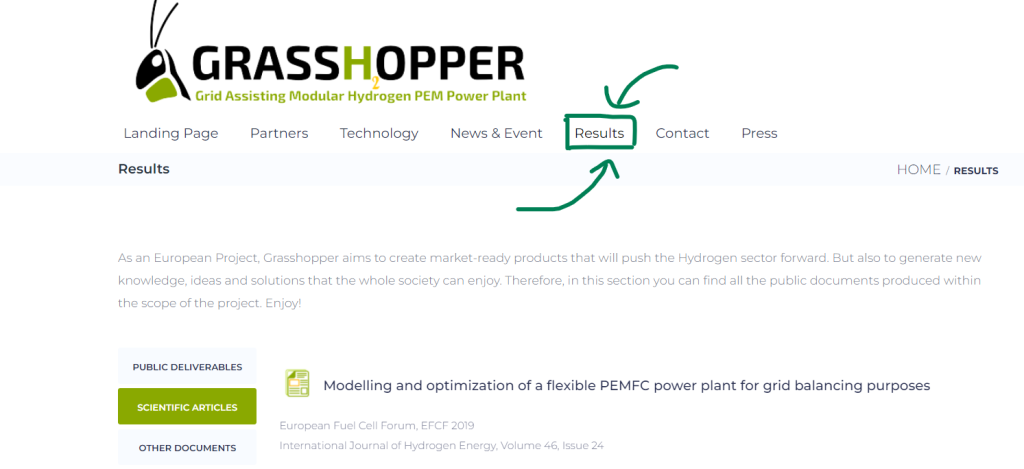Grasshopper project in the IBERCONAPPICE Congress organized by the Spanish Fuel Cells Association
The Grasshopper project was presented by Coxabengoa at the Iberconappice Congress that took place in Cartagena (Spain) between October 25 and 27 in a talk called “Validation of the Power Plant developed in the Grasshopper Project, based on PEM fuel cells and powered with hydrogen”.
Grasshopper is a 100-kW power plant, based on fuel cells, capable of operating dynamically and making demand changes in seconds without any risk to the fuel cells thanks to a robust control system. It has been developed to provide precise control of flow, pressure, temperature, and humidity that allows the operating setpoint to be dynamically changed while maintaining high electrical efficiency. Following the success of the first phase of testing carried out at Coxabengoa’s testing facilities in Seville (Spain), the plant has been transported to the Netherlands to carry out a second phase of validation testing. There, the plant has been connected to the local electrical grid, where the net energy production was used by other consumers on the same grid, confirming the plant’s performance and the “plug & play” design of the unit.
These successful results of the project have aroused much interest among those attending the congress.
For more details about the IBERCONAPPICE Congress check the following link:
https://iberconappice.appice.es/
We will come back soon with very interesting news.
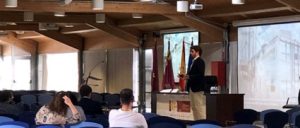
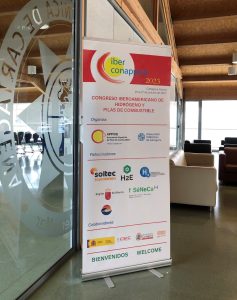
The Grasshopper pilot plant passes long-term operation tests
As mentioned before, Grasshopper is a new generation power pilot plant based on fuel cells, PEM type, which differs from the current ones in that it is able to operate dynamically with rapid response, which allows to contribute to developing a circular economy and zero-emission society providing grid stabilization services.
The Grasshopper fuel cell power plant, which has been in operation since its arrival in the Netherlands last year, has successfully passed the long-term operation tests. This great milestone has been achieved thanks to the productive collaboration between Abengoa and Nedstack.
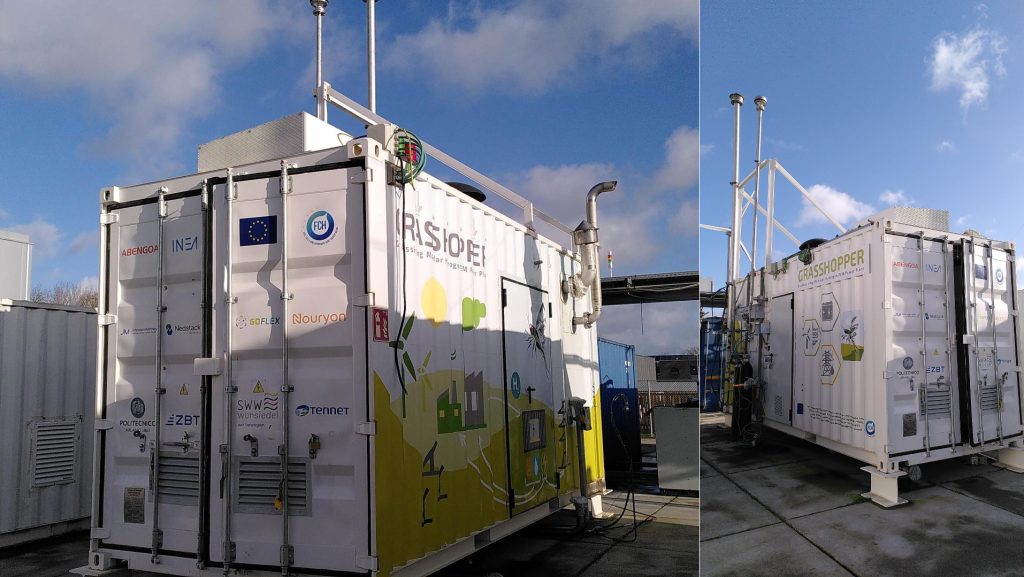
Grasshopper project presented at the Universities located in Seville (Spain)
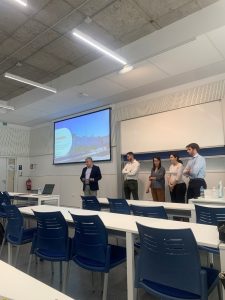
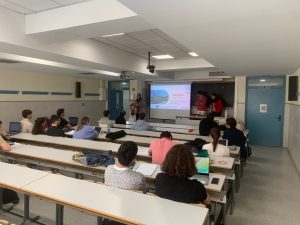
Abengoa, an international company that applies innovative technology solutions for sustainable development in the infrastructure, energy and water sectors, through Abengoa Innovación, had the opportunity to present the Grasshopper Project in the main Universities of Sevilla (Spain), in which it participates and whose objective is the production of sustainable energy through a Fuel Cell Power Plant using Hydrogen.
The first seminar took place in March for the students of “Hydrogen-based Systems” subject of the Degree in Energy Engineering taught at the “Higher Technical Engineering School” of the University of Seville. The second one was organized in April for students of the “Industrial Technologies Projects” subject that is part of the Engineering degrees at the Loyola University.
During these sessions, the students were explained the importance that Green Hydrogen and Fuel Cell Technologies have nowadays, the status of the Grasshopper Project, some of the lessons learnt during the construction phase of the project and some of the results of the tests that are being carried out.
The Grasshopper Project continues being disseminated to reach different audience target, brilliant students this time. We will come back soon with very interesting news.
__________________________________________________________________________________________________
This project has been funded by the Fuel Cells and Hydrogen 2 Joint Undertaking undersigned agreement number 779430. It is supported by the European Union’s Horizon 2020 framework program for research and innovation and by the Hydrogen Europe and Hydrogen Europe Research associations.
Read MoreGrasshopper project in the webinar organized by the Spanish Fuel Cells Association
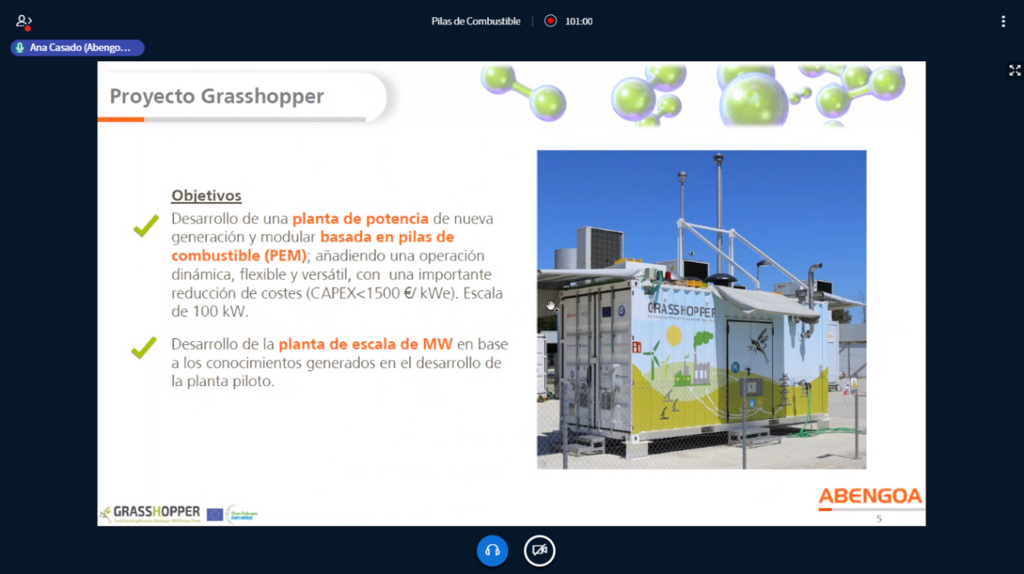
Abengoa, an international company that applies innovative technology solutions for sustainable development in the infrastructure, energy and water sectors, through Abengoa Innovación, has participated at the “Fuel cells and Hydrogen in the energy scenario” webinar, in the panel of Industrial Initiatives. The presentation of Abengoa has been focused on the Grasshopper project in which it participates and whose objective is the production of sustainable energy from hydrogen using fuel cells.
This online webinar, organized by the Spanish Fuel Cells Association (APPICE) and that took place on January 31st, has been a great opportunity for the Grasshopper project to spread its promising and successful results and promote its second phase in the Netherlands.
For more details of the webinar agenda check the following link:
https://appice.es/docs/Programa-Seminario-APPICE-31En23.pdf
We will come back soon with very interesting news.
About Abengoa
Abengoa applies innovative technology solutions for sustainability in the infrastructure, energy, and water sectors. (www.abengoa.com)
Read MoreGrasshopper project in the EU Hydrogen Week
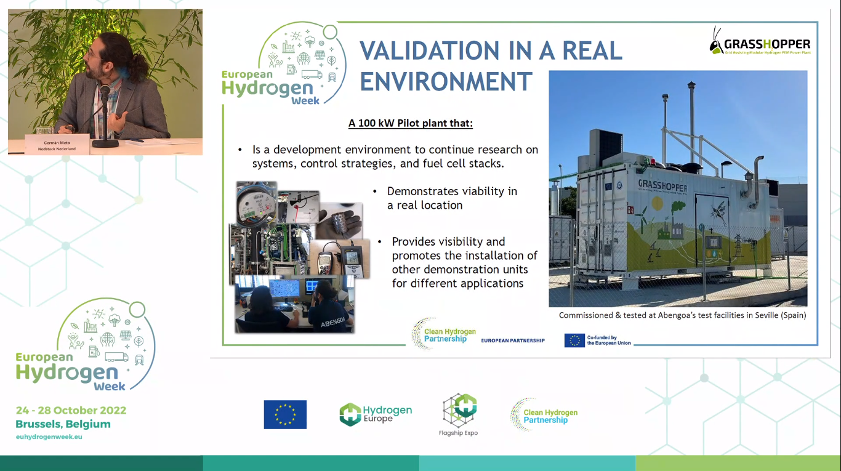
Yesterday, October 27th, the Grasshopper project was presented at the European Hydrogen Week during the EU Research Days, among other projects, specifically at the “End users: heat and power” session.
The European Hydrogen Week is an annual event dedicated to the clean hydrogen technologies. It is co-organized by the Clean Hydrogen Partnership and its members, the European Commission, Hydrogen Europe, and Hydrogen Europe Research. Abengoa, the international company that applies innovative technology solutions for sustainability in the infrastructures, energy and water sectors, trough Abengoa Innovación, is an active member of the Hydrogen Europe.
The Grasshopper project has received great interest at the event for being a new generation of Hydrogen Fuel Cell Power Plants: more cost effective, flexible in energy production, achieving an estimated CAPEX below 1500 EUR/kWe at an annual production rate of 25 MWhe, and with promising results during the testing phase.
For more information about the agenda of the European Hydrogen Week 2022, check the following link:
This project has been funded by the Fuel Cells and Hydrogen 2 Joint Undertaking undersigned agreement number 779430. It is supported by the European Union’s Horizon 2020 framework program for research and innovation and by the Hydrogen Europe and HydrogenEurope Research associations.
Read MoreThe Pilot Plant has been transferred to The Netherlands!!!
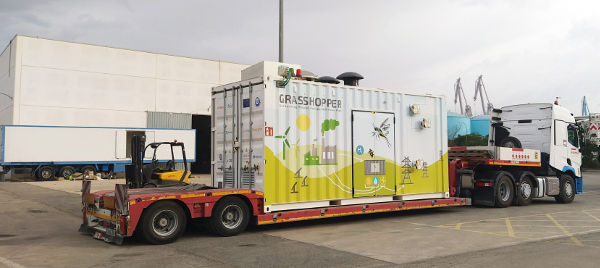
After some quite busy summer months, we are glad to announce that the GRASSHOPPER Pilot Plant has been moved successfully to The Netherlands. Milestone achieved last September!!!
The pilot plant has been transported by land to The Netherlands. The departure point was the Abengoa’s testing facilities, at the Port of Seville (Spain). At its final destination, the SAT (Site Acceptance Test) will be carried out, and then, the demonstration plant will be in operation for its final validation.
This new phase will serve for obtaining valuable information from the PEM Fuel Cell Power Plant (FCPP) technology.
Tips:
- The Grasshopper project creates a new generation of FCPP capable of generating electricity and heat without emissions from hydrogen using fuel cells, with water as the only by-product.
- Don´t miss the awesome videos in our YouTube channel: https://www.youtube.com/c/GrasshopperProject?app=desktop
Missed the webinar? Watch it online now
For those who missed the webinar that took place on 28th of March, there is no need to worry. The session was recorded and uploaded to Youtube. Or perhaps you want to revisit some interested data? Whichever your reason, you can re-watch the whole event right here. And don’t forget to contact us!

Project webinar – It is time to meet the team
After many months of hard work, setbacks and achievements, we are approaching the project end. During the last months, we have had the opportunity to present the project to some lucky groups that were able to travel to Seville and see the plant live. However, as it happened with any other aspect of our lives, covid prevents us from scheduling any live event. But there is always a bright sight! The grasshopper team has prepared a public webinar to share our learning and experience with the world. Here is a brief summary of the content you can expect in the webinar
- Overview of project goals and objectives
- Main results and achievement obtained so far
- Virtual tour to the 100 kW pilot plant
- Questions and interaction with the technical members of the project
There are limited spots, so be sure to register using the following link! Also, check out our new introductory video of the project, including a sneak peak to the pilot plant.
—> Register now here! <—-
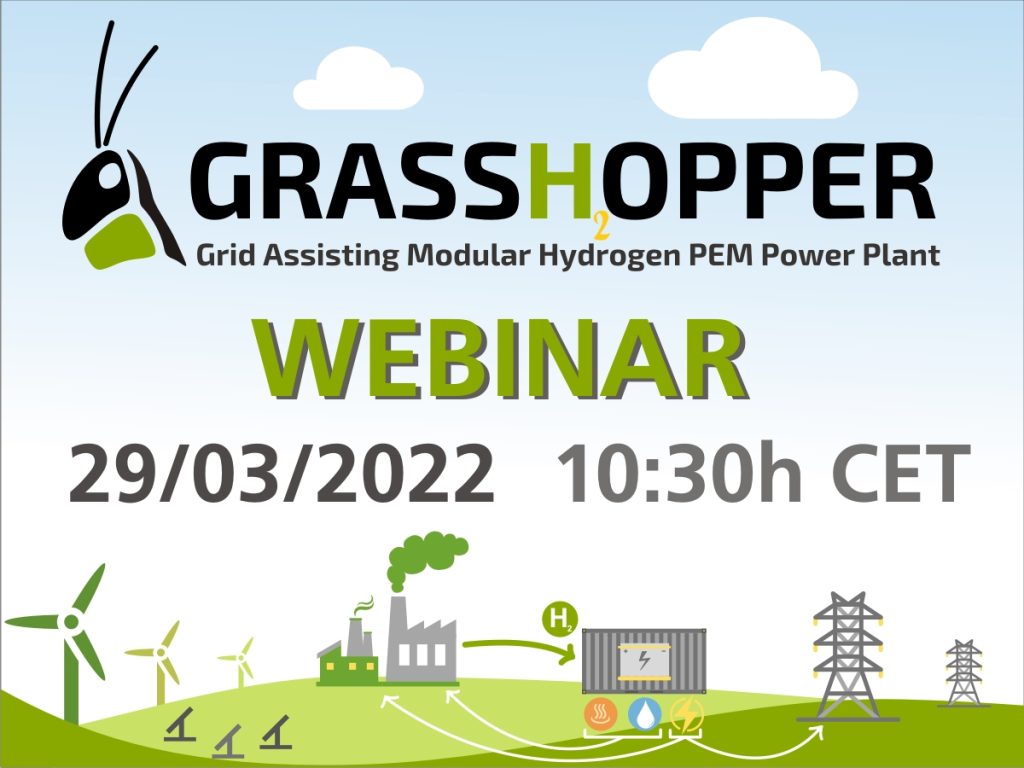
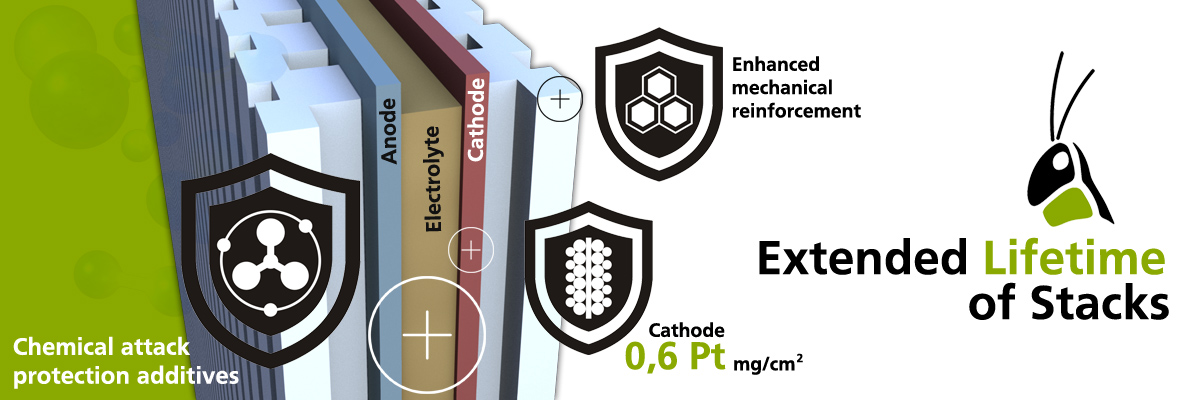
Initial performance results on new MEA – Built To Last
To achieve lower production costs and improve durability of Fuel Cell Power plants, it is essential to develop a new generation of MEAs (Membrane Electrode Assemblies). Johnson Matthey (JM) developed a new fuel cell membrane-electrode assembly (MEA) for a flexible, grid-supporting hydrogen power plant. To achieve the project objectives, JM’s MEA had to be durable, powerful, inexpensive and capable of flexible operation in response to changes in demand. Building on recent advances in automotive fuel cell technology and high volume manufacture at JM, it was possible to reach target manufactoring costs. Further enhancing the resulting MEA with measures to extend the lifetime.
The EU’s VOLUMETRIQ project (FCH-JU grant no. 671465) devised a drive cycle partly based on the New European Drive Cycle. A Drive Cycle is a series of data points of speed of a vehicle against time that is design to simulate the standard behaviour of vehicle. Applying it to fuel cells, the profile is transformed into current vs time. Its shape is shown below

Due to its high varibility and changing load, is a great tool to evaluate performance and degradation of the membrane with load changes. The GRASSHOPPER MEA contained a 20 μm membrane electrolyte with a reinforcement, stabilised against chemical attack. As a result, the MEA showed a very high stability in drive cycle testing. The minimal loss of performance over the lifetime of the test, combined with a period of initial performance gain during CCM conditioning over time, led to near-zero measured degradation over 10 000 hrs.

The developed MEAs are being built into stacks by GRASSHOPPER project partners Nedstack FCT, whose stacks power the 100 kW pilot-scale plant, assembled by Abengoa Innovacion. Operating the plant over its lifetime will allow us to gather real-world grid-assisting power data for this fuel cell technology.
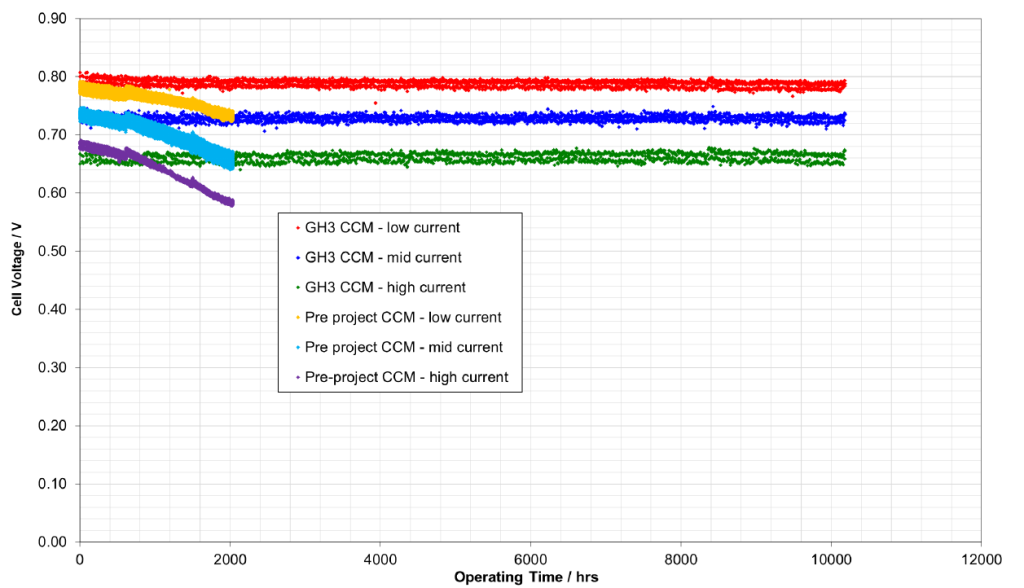
Results. A new section of our website
We have accumulated a good amount of results already. So its time to share them. As an European project, some of the data generated is labelled as “public”. Being our duty to make it accessible to the general population. For that purpose, we want to introduce you to the results section of the website. You can easily access it in the top menu and will allow you to download all the documents as we generate them. We distinguish between several types of document:
- Official European documentation.
- Scientific publications. Either in magazines, congress or similar
- Other interesting documents
During the last years, Politecnico di Milano, as a consortium partner, participated in the “Applied Energy Symposium: 100% Renewable” as well as other events. This particular event was a forum organised by the University of Pisa (Italy) to discuss and share the latest advancement towards a cleaner energy system. For said event, we published a paper titled: “Simulations of a flexible 100 kWel PEM Fuel Cell power plant for the provision of grid balancing services”. Where Polimi studies the potential capabilities of the pilot plant based on a computational model of the plant. This and other papers are already available in this section of the website, so keep checking it for updates!
